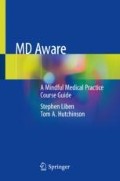Abstract
This sixth class has students explore different ways of responding to the universal experiences of pain and suffering that are either overtly or covertly embedded in patients’ reasons for seeking medical care. A subject that is rarely explored within the formal medical curriculum, how to respond helpfully to suffering, is an everyday challenge for clinicians. The etymology of the word “patient” comes from the Latin word for suffering. Patients, those who suffer, seek out medical care to help them feel better and eliminate, or at least reduce, their suffering.
Access this chapter
Tax calculation will be finalised at checkout
Purchases are for personal use only
References
Cassel EJ. The nature of suffering and the goals of medicine. N Engl J Med. 1982;306(11):639–45.
McCracken LM, Gauntlett-Gilbert J, Vowles KE. The role of mindfulness in a contextual cognitive-behavioural analysis of chronic pain-related suffering and disability. Pain. 2007;151(1):63–9.
Veehof MM, Oskam MJ, Schreurs KMG, Bohlmeijer ET. Acceptance-based interventions for the treatment of chronic pain: a systematic review and meta-analysis. Pain. 2011;152(3):533–42.
Wetherell JL, Afari N, Rutledge T, et al. A randomized controlled trial of acceptance and commitment therapy and cognitive-behavioural therapy for chronic pain. Pain. 2011;152(9):2098–107.
Turk DC, Meichenbaum D, Genest M. Pain and behavioral medicine: a cognitive-behavioral perspective. New York: Guilford Press; 1983.
Halifax J. A heuristic model of enactive compassion. Curr Opin Support Palliat Care. 2012;6(2):228–35.
Solomon S, Greenberg J, Pyszczynski T. A terror management theory of social behavior: the psychological functions of self-esteem and cultural worldviews. Adv Exp Soc Psychol. 1991;24:93–159. https://doi.org/10.1016/S0065-2601(08)60328-7.
Ardnt J, Vess M, Cox C, Goldenberg J, Lagle S. The psychological effect of thoughts of personal mortality on cardiac risk assessment. Med Decis Mak. 2009;29(2):175–81.
Solomon S. The effects of mortality salience and neuroticism on medical students’ treatment preferences for patients with terminal illnesses. Unpublished pilot data. Skidmore College; 1999.
Gilpin R. The use of Theravāda Buddhist practices and perspectives in mindfulness-based cognitive therapy. Contemporary Buddhism. 2008;9(2):227–51. https://doi.org/10.1080/14639940802556560.
Davidson RJ, Kaszniak AW. Conceptual and methodological issues in research on mindfulness and meditation. Am Psychol. 2015;70(7):581–92. https://doi.org/10.1037/a0039512.
Author information
Authors and Affiliations
Rights and permissions
Copyright information
© 2020 Springer Nature Switzerland AG
About this chapter
Cite this chapter
Liben, S. (2020). Class 6: Responding to Suffering. In: MD Aware. Springer, Cham. https://doi.org/10.1007/978-3-030-22430-1_8
Download citation
DOI: https://doi.org/10.1007/978-3-030-22430-1_8
Published:
Publisher Name: Springer, Cham
Print ISBN: 978-3-030-22429-5
Online ISBN: 978-3-030-22430-1
eBook Packages: MedicineMedicine (R0)

